BRIMFIELD, Mass.—Tens of thousands of atavists, capitalists, and human curios converge on tiny Brimfield, Massachusetts (population, 3,609), this weekend to party like it’s 1899.
The Brimfield Fair, purportedly the largest outdoor antiques show in the world, resembles how eBay might look freed from its digital shackles.
“There’s more business to be had, however, the margins are lower,” Tom Kienzler, a Connecticut collector selling a creepy mannequin (redundant?), a Canadian 1970s 7-Up ad, and much else, says of how the internet changed his side hustle. “Since the eBay-era has really blossomed, people will come in and immediately go into their phone and look something up.”
Gary Potter, a retiree whose hobby selling wares online pays better than his pension, maintains that the internet ultimately benefits buyers most. “They now are more savvy,” he tells Breitbart News. “Now they’ll sometimes look it up to see if what they’re buying is what it should sell for. Good or bad, that’s information that’s good for the buyer.”
The market works as a massive symbol of buy-low-sell-high capitalism in action. But the passion for profits pales next to the passion for all things Americana. The giant, open-air emporium doubles as a populist classroom that imparts history lessons with every look. What toys children played with in the 1870s, how train signal lights looked like in the aftermath of Thomas Edison, what Doughboys wore fighting World War I, and how companies advertised during the Great Depression all find explanation in visual answers that encroach from every direction. A field of dreams in Massachusetts, at least for three weeks every year, serves as the time machine in which visitors travel to find a lost America.
The Brimfield Fair, which goes by such aliases as the Brimfield Antiques Show and the Brimfield Flea Market, stages three, six-day events every year consisting of about 20 massive flea markets each covering areas generally larger than many football fields. Unlike your local flea market, where glass beads, velvet Elvises, and bootleg DVDs outnumber quality finds, the Central Massachusetts extravaganza emphasizes the rare, old, and, at times, expensive. But at this week’s July event, where the dog days scare away customers, deals aplenty confront: birdhouses made of license plates for $65, a 1938 Philco cabinet radio for $25, and striking metallic folk-art dinosaurs for $95. And if you carry around your bank account in your billfold, a vintage Mexican merry-go-round superman can be all yours for $5,500.
Of course, the purchase price rarely meets the listed price. A $50 wooden Moxie box, for instance, went for $20. The haggling forbidden in most retail stores becomes practically obligatory at Brimfield.
Customers find deals. Dealers, as their name implies, do to.
“Sometimes I have found home runs. Over at May’s [Antique Market] three years ago, I bought a woodworking plane for $40,” Potter told Breitbart News about a purchase at one of Brimfield’s many flea markets. “I sold it for $8,500. So, that was my best profit.”
Most profit margins, particularly after forking over hundreds of dollars to rent space at Brimfield, look far slimmer. Dealers such as Kienzler and Potter pick up items at yard sales, auctions, and estate sales, as well as online. Kienzler says he increasingly buys old surplus inventory in bulk to stay competitive. He picked up dozens of Cold War-era gas masks that he sells for $15. They move fast and he pockets about $5 per exchange.
“During the day, I sell insurance,” Kienzler tells Breitbart News. But in his free time, he buys “anything that’s cool.”
What’s “cool” isn’t always what’s hot.
“The hottest items right now are either the primitives—the old pails and shovels and farm implements and things like that—or the radios,” Kienzler opines. “Christmas is another category that’s really hot lately, if you have vintage Christmas. So, I like to keep a lot of different categories going. Nothing’s more boring than going into a booth and seeing all of one category.”
And some booths simply defy category. Betsy Wilbur, who runs The Red Herring antique shop in the Finger Lakes region of New York, peddles at Brimfield old tin containers turned into arresting art with the help of doll heads and limbs. “They’re a love or hate thing,” she admits. At the high end, the items go for $135. “This is the only artwork I do right now,” she notes. “It’s a good way to recycle.”
And that’s Brimfield in a nutshell, one man’s trash becoming another man’s treasure.
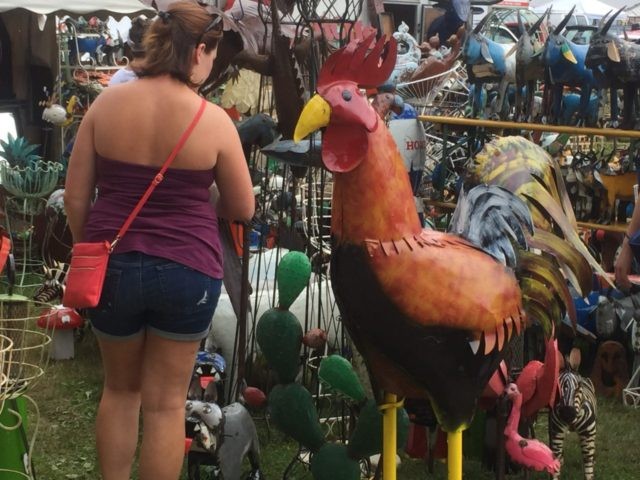
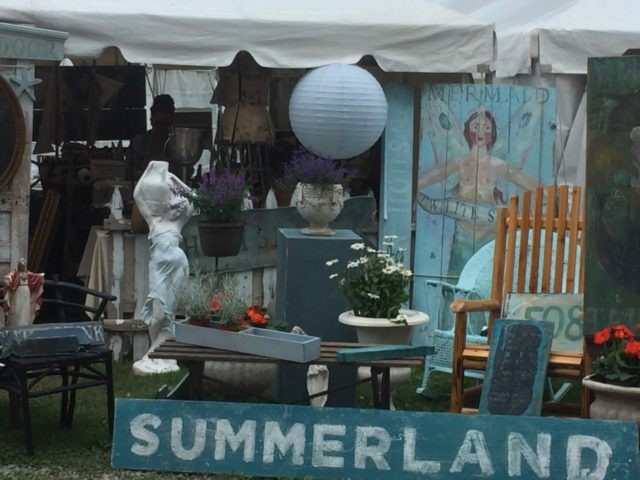
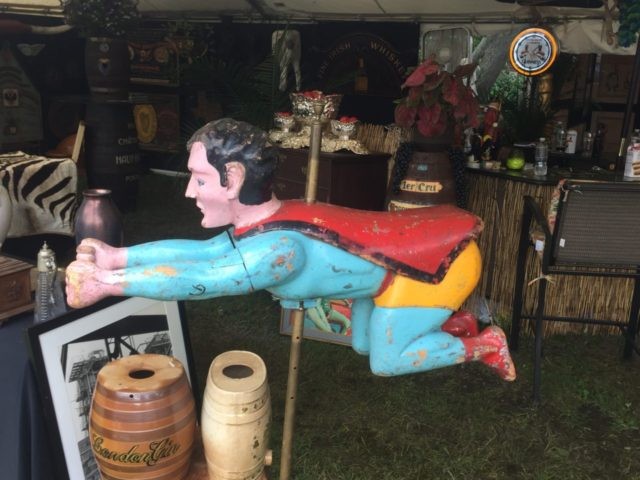
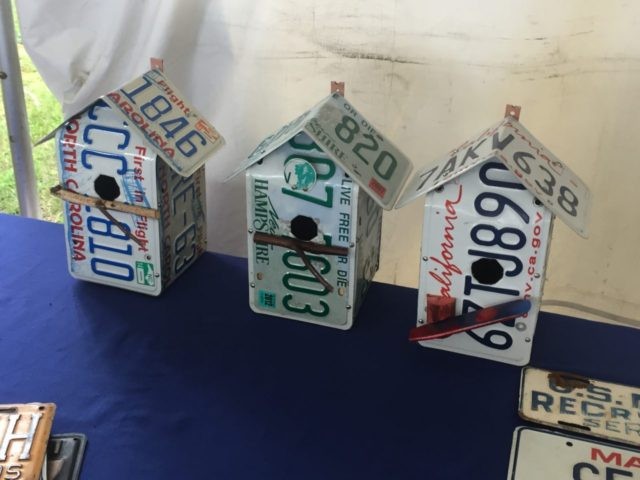
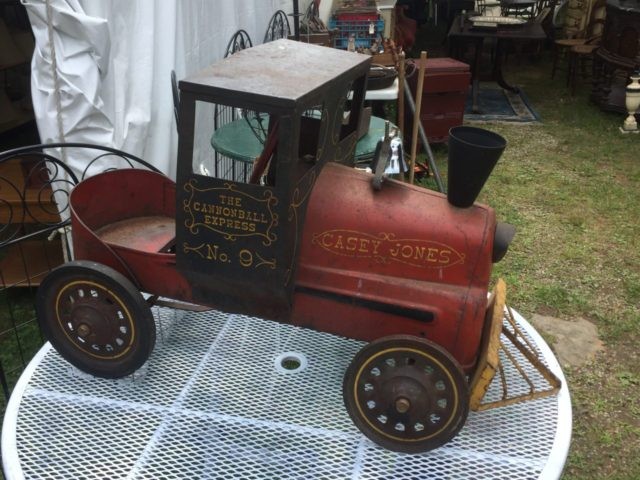
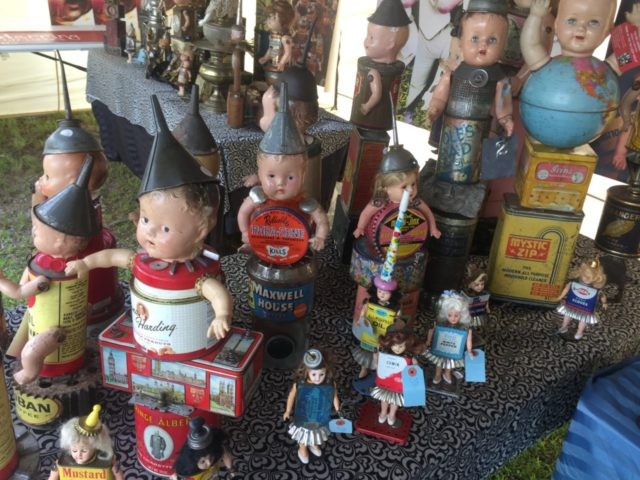
COMMENTS
Please let us know if you're having issues with commenting.